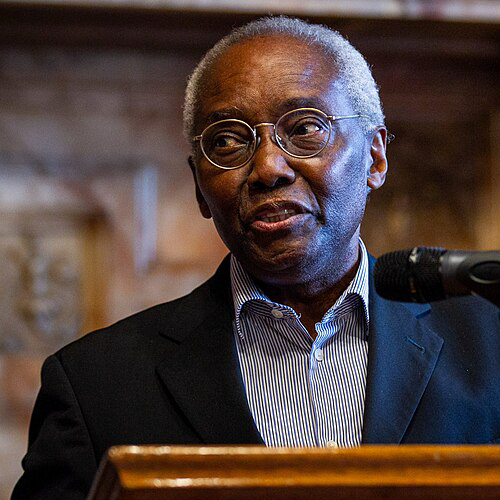Professor Emeritus Sir Godfrey Oliver Palmer (1940 – 2025) a botanist and a chemist, became the first black professor in Scotland when he was promoted to the rank of Professor at Heriot-Watt University in Edinburgh in 1989. Born in St. Elizabeth, Jamaica he grew up mainly in Kingston where he struggled at school. In 1955, just before his 15th birthday, he joined his mother in London where he gained a place at Highbury Grammar School due to his excellent cricketing ability. Three years later he left school with six O-levels and two A-levels, in Botany and Zoology and went to work as a Junior Lab Technician at Queen Elizabeth College, London University whilst studying part-time at a local polytechnic to obtain further qualifications.
Palmer earned a Bachelors’ degree in Botany from the University of Leicester in 1964. Wishing to further his academic career he applied for a scholarship from the English Ministry of Agriculture to study for a M.Sc. at the University of Nottingham but he was unsuccessful at the interview. Luckily for him, one member of the interview panel was impressed and secured him a place to study for a PhD in grain science and technology jointly with Heriot-Watt College and the University of Edinburgh, beginning his doctorate in 1965. After completing his PhD thesis entitled Ultra-structure of cereal grains in relation to germination in 1967, he began research work at the Brewing Research Foundation in Surrey in 1968 where he worked on the science and technology of barley, developing a technique to speed the production of malt from barley which increased profits by millions of pounds for the brewing industry . He eventually became a senior scientist at the Foundation before he moved back to Heriot-Watt University in 1977. After the Nigerian government banned the importation of European malt and barley in the 1980s, Palmer advised international breweries e.g. Heineken and Guiness on the use of local grains such as sorghum in their African breweries.
He received a Doctorate of Science in 1985, and a personal Chair at Heriot-Watt in 1989 and on his retirement in 2005 he was made Professor Emeritus. In 1998, Palmer became the fourth individual and first European, to be honoured with the American Society of Brewing Chemists (ASBC) Award for distinction in scientific research and good citizenship: he received the award in Boston, Massachusetts, in 2008. Palmer was awarded honorary doctorates by several universities including in 2015, the University of the West Indies and the University of Technology, Jamaica. In 2019, he was awarded the Gold Musgrave Medal from the Institute of Jamaica.
Professor Palmer is also renowned for his work as a human rights activist, striving to promote improved race relations including through a better understanding of the culture of especially children from different ethnic backgrounds, to help them improve their educational performance.
In recognition of his work and achievements in the field of grain science, Palmer was appointed Officer of the Order of the British Empire (OBE) in 2003. He was knighted in the 2014 for services to human rights, science, and charity. In March 2024, King Charles III appointed Palmer a knight of the Most Ancient and Most Noble Order of the Thistle (KT), the highest order of chivalry in Scotland.

Created by Fiwi Admin Team
Biotechnology
Deceased - Professor Emeritus - Heriot-Watt University, Scotland
Jamaica